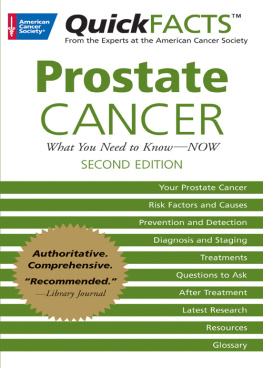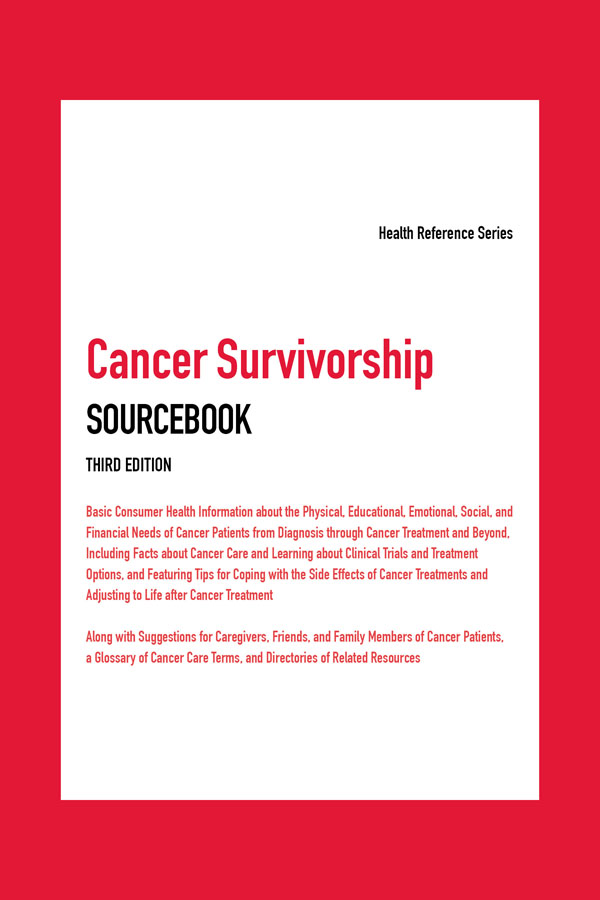CANCER SURVIVORSHIP
SOURCEBOOK
THIRD EDITION
Health Reference Series
CANCER SURVIVORSHIP
SOURCEBOOK
THIRD EDITION
Basic Consumer Health Information about the Physical, Educational, Emotional, Social, and Financial Needs of Cancer Patients from Diagnosis through Cancer Treatment and Beyond, Including Facts about Cancer Care and Learning about Clinical Trials and Treatment Options, and Featuring Tips for Coping with the Side Effects of Cancer Treatments and Adjusting to Life after Cancer Treatment
Along with Suggestions for Caregivers, Friends, and Family Members of Cancer Patients, a Glossary of Cancer Care Terms, and Directories of Related Resources

615 Griswold St., Ste. 520, Detroit, MI 48226
Bibliographic Note
Because this page cannot legibly accommodate all the copyright notices, the Bibliographic Note portion of the Preface constitutes an extension of the copyright notice.
* * *
OMNIGRAPHICS
Angela L. Williams, Managing Editor
* * *
Copyright 2020 Omnigraphics
ISBN 978-0-7808-1784-5
E-ISBN 978-0-7808-1785-2
Library of Congress Cataloging-in-Publication Data
Names: Williams, Angela, 1963- editor.
Title: Cancer survivorship sourcebook / edited by Angela L. Williams.
Description: Third edition. | Detroit, MI: Omnigraphics, [2020] | Series: Health reference series | Includes index. | Summary: Provides basic health information for cancer survivors, such as seeking medical assistance, side effects of cancer treatments, cancer-related research studies, maintaining health during and after treatment, along with the guidelines for friends, family members, and caregivers to take care of cancer survivors. Includes glossary, index, and other resources-- Provided by publisher.
Identifiers: LCCN 2019052649 (print) | LCCN 2019052650 (ebook) | ISBN 9780780817845 (library binding) | ISBN 9780780817852 (ebook)
Subjects: LCSH: Cancer--Popular works. | Cancer--Patients--Care. | Cancer--Patients--Life skills guides.
Classification: LCC RC263.C296 2020 (print) | LCC RC263 (ebook) | DDC 616.99/4--dc23
LC record available at https://lccn.loc.gov/2019052649
LC ebook record available at https://lccn.loc.gov/2019052650
Electronic or mechanical reproduction, including photography, recording, or any other information storage and retrieval system for the purpose of resale is strictly prohibited without permission in writing from the publisher.
The information in this publication was compiled from the sources cited and from other sources considered reliable. While every possible effort has been made to ensure reliability, the publisher will not assume liability for damages caused by inaccuracies in the data, and makes no warranty, express or implied, on the accuracy of the information contained herein.

This book is printed on acid-free paper meeting the ANSI Z39.48 Standard. The infinity symbol that appears above indicates that the paper in this book meets that standard.
Printed in the United States
PREFACE
About This Book
Cancer is not a single disease. It is the name given to a group of related diseases that all share a common characteristic: some of the bodys cells do not die when they should. Instead they continue to grow and divide. Through this process, cancer cells damage various tissues and organs, causing a broad array of symptoms and even death. The cancer death rate in the United States has declined since the early 1990s. SEER Cancer Statistics Review findings between 1991 and 2015 indicate that the overall cancer death rate has gone down by 26 percent. A decline in the death rate means an increase in the number of survivors. However, cancer survivorship presents multiple challenges. Cancer survivors often lack the information they need to make treatment choices, maintain optimal physical and mental health during and after treatment, prevent disability and late effects associated with cancer, and handle economic issues related to cancer care.
Cancer Survivorship Sourcebook, Third Edition provides information for cancer patients and their family members, friends, and caregivers. It includes facts about cancer care, treatment advances, and clinical trials, and offers suggestions for coping with the side effects and complications of cancer treatments. Facts about emotional, cognitive, and mental-health issues in cancer care are included, and also focus on the challenges of maintaining wellness during and after cancer treatment. A glossary of cancer care terms is provided, along with a directory of resources for cancer patients and information about financial assistance for cancer care.
How to Use This Book
This book is divided into parts and chapters. Parts focus on broad areas of interest. Chapters are devoted to single topics within a part.
provides facts about the tests that are used to diagnose cancer and information on how to understand the diagnosis made.
discusses various strategies that can help a cancer patient research and understand issues related to his or her own care, including their prognosis. It also provides an overview of commonly used cancer treatments, medications, and complementary and alternative medicine (CAM) practices. It also discusses the use of palliative and hospice care and describes the transitions that may occur during care if cancer treatments are not effective in halting the advance of the disease.
provides information for cancer patients who are considering participating in cancer-related research studies. It explains the procedures commonly used in clinical trials and explains how to locate one. It also offers updated information about recent research results, new treatments, and current research initiatives that offers hope for the future.
discusses unwanted side effects that often accompany commonly used cancer treatments. It explains why treatments can cause such physical effects as nausea, vomiting, hair loss, and fatigue. It also includes practical suggestions for dealing with these types of effects and other medical complications of cancer treatment.
provides facts about the nonphysical effects and complications of cancer and its treatment. These include changes in self-image that result from illness or from body-altering surgical procedures and the ways people adjust to new circumstances. It also describes mental-health disorders that may accompany cancer treatment, including depression, anxiety, posttraumatic stress disorder (PTSD), and substance abuse.
describes steps cancer survivors can take to achieve optimal health while they are receiving cancer treatments and after their treatments have been completed. These include eating a healthy diet, types of nutrition support available, participating in rehabilitative programs, exercising, and smoking cessation. Additional chapters address concerns related to resuming normal life once cancer treatment is over and appropriate follow-up care.
offers guidelines for dealing with family matters, life planning, and practical aspects of cancer caregiving. Individual chapters address specific concerns of loved ones, parents, children, and siblings.
includes a glossary of cancer care terms and a glossary of terms commonly used by health insurance companies and in medical billing. It also offers directories of resources able to provide services and support to cancer patients and their families.







